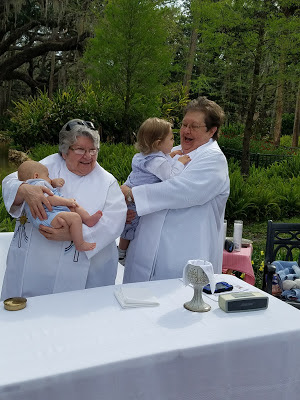 |
| Miriam Picconi (left) and Wanda Russell (right) ARCWP Priests, baptize two babies at Easter Liturgy, Palm Coast, FL, April, 2017 |
My Response: While women deacons and priests do not preside at sacramental rites in local parishes, the Catholic "nones" and "dones" call upon them to officiate at weddings, baptisms, funerals, and Masses where all are welcome to receive Eucharist. Roman Catholic Women Priests have been providing inclusive celebrations of sacraments for the "nones" and "dones", and all who are ready for a new birthing of the Spirit since 2002!
For more information, contact:https://arcwp.org and/or https://romancatholicwomenpriests.org/
According to the Pew Research Center those who have left Catholicism outnumber those who have joined the Catholic Church by nearly a four-to-one margin. Overall, one-in-ten American adults (10.1%) have left the Catholic Church after having been raised Catholic, while only 2.6% of adults have become Catholic after having been raised something other than Catholic.
Many Catholics long for a more expansive faith, focused on Original Blessing rather than Original Sin. They believe that religious teaching should promote a God of Love, rather than a God of fear. They ask how a loving God could require the death of Jesus as restitution for the Original Sin of Adam and Eve? It is time to drop a medieval theology that originated with St. Augustine's teachings in the fourth century.
Bridget Mary Meehan ARCWP
There is a deep longing for the spirituality that Progressive Christianity provides. While an increasing number of people identify as "nones" and "dones," surveys show that most still believe in God and identify as Christian, while only a small percentage (3% in the US) identify as atheists. This means that people have not stopped believing in God, they've just found the institutional church to be a poor, often inauthentic, mediator of the divine presence. Progressive Christianity strives to be an intellectually honest voice and—with a bit of effort to spread our message—can be the breath of fresh air that religion-weary people need.
The Progressive Christian Movement itself is also in the process of changing. Many are beginning to realize that there are a lot of important voices that have not been heard because whole groups of people haven't been seated at the table. The future of Progressive Christianity will be much more diverse and this will necessarily influence both theological and social stances. I imagine this will lead to less emphasis on deconstructing theology and more emphasis on reconstructing authentic faith while engaging in social justice causes for those who have been historically marginalized.

No comments:
Post a Comment
Note: Only a member of this blog may post a comment.